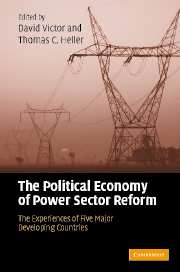Book contents
- Frontmatter
- Contents
- List of figures
- List of tables
- Notes on contributors
- Preface
- 1 Introduction and overview
- 2 Political economy of the Brazilian power industry reform
- 3 Reform of the Chinese electric power market: economics and institutions
- 4 The political economy of Indian power sector reforms
- 5 The Mexican Electricity Sector: economic, legal and political issues
- 6 The political economy of power sector reform in South Africa
- 7 Major conclusions: the political economy of power sector reform in five developing countries
- Bibliography
- Index
5 - The Mexican Electricity Sector: economic, legal and political issues
Published online by Cambridge University Press: 22 September 2009
- Frontmatter
- Contents
- List of figures
- List of tables
- Notes on contributors
- Preface
- 1 Introduction and overview
- 2 Political economy of the Brazilian power industry reform
- 3 Reform of the Chinese electric power market: economics and institutions
- 4 The political economy of Indian power sector reforms
- 5 The Mexican Electricity Sector: economic, legal and political issues
- 6 The political economy of power sector reform in South Africa
- 7 Major conclusions: the political economy of power sector reform in five developing countries
- Bibliography
- Index
Summary
Introduction
This chapter aims to explain the motivations and strategies for reform in the Mexican Electricity Sector. Our focus is on the effects of politically organized interests, such as unions and parties, on the process of reform. We show how particular forms of institutions – notably, the state-owned enterprises (SOEs) within the power sector as well as the state firm that supplies most fuels for electricity generation – shape the possibilities and pace of reform. The tight integration of these SOEs with the political elite, opaque systems for cost accounting, and various schemes for siphoning state resources explain why these institutions have survived and the actual progress of reform has been so slow. Where private investors have been allowed into the market it has been only at the margin through the independent power producer (IPP) scheme, an oxymoron since the purchase agreements and dispatch rules that determine payment to these IPPs are dominated by the state.
In its origins in the late nineteenth century, the Mexican power system grew as a series of privately owned, vertically integrated regional monopolies. Investors, mainly from firms based in foreign countries, built power systems in areas where they thought they could earn a profit – mainly mining and textile industrial areas as well as the largest cities – while leaving aside most rural areas. The Mexican Revolution period (1910–1917), and the political consolidation of the country (which included the assassination of President Álvaro Obregón) caused foreign private investment to trickle.
- Type
- Chapter
- Information
- The Political Economy of Power Sector ReformThe Experiences of Five Major Developing Countries, pp. 175 - 214Publisher: Cambridge University PressPrint publication year: 2007
- 4
- Cited by



